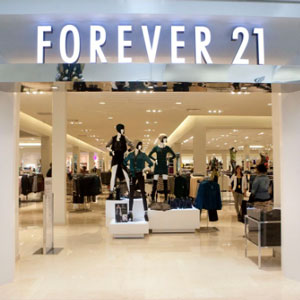
Barring any last-minute bids, fast-fashion retailer Forever 21 will soon be sold to a trio of buyers—commercial developers Simon Property Group and Brookfield Property Partners and brand management company Authentic Brands Group—in an $81 million deal this month.
The privately held retailer filed for bankruptcy in September and has shuttered more than 100 stores and slashed $100 million in operational costs since then, according to court documents.
In a court filing Sunday, the Los Angeles–based retailer said it had reached a stalking horse purchase agreement (a bid for a bankrupt company made in advance of an auction) with the three companies. The sale will include its e-commerce business and offshoot brands including beauty store Riley Rose.
A judge still has to approve the investors, and there’s always the chance another prospective buyer could put in a bid for the Los Angeles chain (they have until Feb. 7), though that scenario is unlikely. Simon and Brookfield are among Forever 21’s top unsecured creditors—a list that also includes Vornado Realty Trust, Macerich, and Unibail-Rodamco-Westfield.
Authentic Brands Group made news late last year when it acquired Barneys New York in a $270 million deal. Its portfolio also includes jewelry brands Neil Lane and Judith Leiber; clothing labels Juicy Couture, Volcom, and Aeropostale; and shoemakers Nine West and Frye.
Simon Property Group owns and operates 233 malls and outlets globally and helped pioneer the popular premium outlet mall concept. Brookfield Property Partners, according to its website, owns, operates, and develops “one of the largest portfolios of office, retail, multifamily, industrial, hospitality, triple net lease, self-storage, student housing, and manufactured housing assets.”
Forever 21 has been a staunchly independent and private company since its founding in the 1980s by Jin Sook and Do Won Chang. The retailer’s sharp ascent—at its peak it operated 800 stores globally—hinged on its ability to provide just-off-the-runway fashion to stores quickly, for a fraction of the cost of designer apparel. For consumers, it was a revelation.
But times have changed. And fashion companies that practice and promote sustainability and supply chain transparency, such as Everlane and Lululemon, are moving into the fore. Many hyper-educated fashion consumers now equate “fast fashion” with corporate malfeasance, as the category’s breakneck production has been exposed as harmful to the environment.
If Forever 21 is to survive its next era, its new owners will need to transform its operations to reflect evolving consumer values, then fling open its famously clenched back doors to give a new wave of fashion-hungry consumers a good look inside.
(Photo courtesy of Forever 21)
Follow me on Instagram: @emilivesilind
- Subscribe to the JCK News Daily
- Subscribe to the JCK Special Report
- Follow JCK on Instagram: @jckmagazine
- Follow JCK on X: @jckmagazine
- Follow JCK on Facebook: @jckmagazine